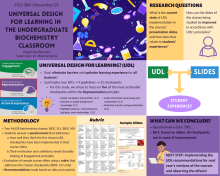
What areas should Canada protect to save species at risk of extinction?
At the recent COP 15 conference in Montreal, Canada committed to protecting 30% of its land by 2030, but which areas are most crucial to protect for at-risk species such as the spotted turtles?

Cutting down on social media to improve teens and young adults’ body image
Teens in North America are spending several hours per day on screens, and there’s growing concern over how social media may affect their mental health.

SciLearn mis en vedette sur Radio-Canada
Le programme SciLearn du Bureau de l’enseignement des sciences (Office of Science Education) à l’université McGill a été mis en vedette lors du dernier épisode de Les années lumière sur Radio-Canada:
Major advance in research on melanin, the pigment that colours skin, eyes, and hair
For the first time, scientists produce an organic molecule that mimics melanin’s essential properties

Congratulations to STEMM Diversity@McGill!
The results are in for the 2023 Principal’s Prize for Public Engagement through Media and STEMM Diversity@McGill is among the runners-up recognized in the Group category.
Johanna Nešlehová receives 2023 Krieger-Nelson Prize
The Canadian Mathematical Society (CMS) has selected Professor Johanna Nešlehová as the 28th recipient of the Krieger-Nelson Prize. This award, established in 1995, recognizes outstanding contributions to research by a woman or female-identifying mathematician working in Canada.

Hundreds Gather for Undergraduate Poster Showcase
McGill community comes together to celebrate the research of over 100 undergraduate students from the Faculty of Science and beyond in an annual event organized by the Office of Science Education.

School of Religious Studies to host conversations on Science and Faith
The ongoing dialogue between science and faith will be the focus of two upcoming events hosted by the School of Religious Studies.

MSSI announces 2023 Ideas Fund recipients
The McGill Sustainability Systems Initiative (MSSI) has announced the results of its latest Ideas Fund competition. The Ideas Fund awards seed funding to projects led by McGill researchers, enabling them to pursue high-risk, high-reward projects in sustainability research.

Story on new Climate Action course featured on McGill homepage
Worried about the climate crisis? Want to learn about climate change from experts and explore what you can do about it?
McGill has a course for you.
The primary goal of FSCI198: Climate Crisis and Climate Actions is to enable students to find enough hope to want to engage with the climate crisis.

Faculty of Science father-son duo help team win coveted intramurals ice hockey championship mug
When Professor Sebastien Breau of the Department of Geography (far left) first joined the 50s hockey team back in 2010, Vincent (second from left) was only seven years old. Now a first-year Statistics and Computer Science student at McGill, Vincent and his dad helped their team win the coveted intramurals ice hockey championship mug.

Connecting Students with Researchers through Soup
Although approaching professors to discuss research opportunities might seem daunting for undergraduate students, there’s an ingredient for success: soup!

McGill Department of Chemistry signs the Green Chemistry Commitment
The McGill University Department of Chemistry has signed the Green Chemistry Commitment (GCC) from Beyond Benign, an organization that develops and disseminates green chemistry and sustainable science educational resources that empower educators, students, and the community at large to practice sustainability through chemistry.

Professor Marcin Sabok and PhD student Matt Bowen featured in Quanta Magazine
Last year, Professor Marcin Sabok and PhD student Matt Bowen of the Department of Mathematics and Statistics published an important advance in what's known as Ramsey Theory.

The Science (Students) of Course Change #4 – Universal Design for Learning in Biochemistry
For instructors and course designers, the optimal way to structure a course is a critical question. With many pedagogical perspectives and a diverse array of student needs, it is challenging to find instructional methods that work for everyone.
